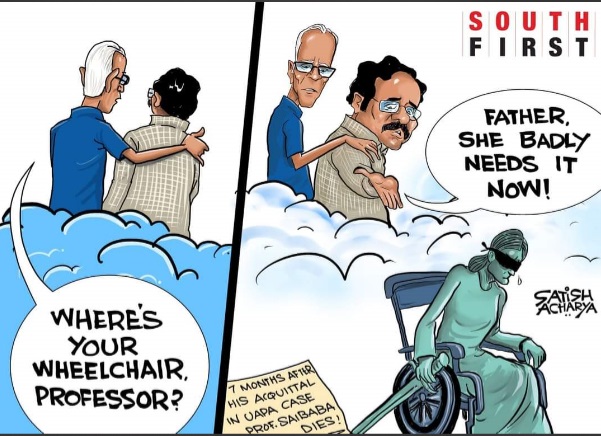 The Right to Live Under the Grip of UAPA Eenadu 15.10-2024
The Right to Live Under the Grip of UAPA Eenadu 15.10-2024
Professor Saibaba, who languished in prison for ten years for a crime he did not commit, passed away last Saturday. With a 90% disability, he endured a hellish experience in a dark cell. He was not even allowed to see his mother one last time when she passed away.
The Bombay High Court, which determined that there was no evidence to support the charges against Saibaba, overturned his life sentence last March, describing the criminal proceedings against him as a 'judicial failure.'
(English translation of editorial of Telugu newspaper Eenadu, dated 15-10-2024)
The Right to Live Under the Grip of UAPA
(English translation of editorial of Telugu newspaper Eenadu, dated 15-10-2024)
In the Constituent Assembly debates, Dr. B.R. Ambedkar clearly stated that there is no need to grant the government the absolute power to detain anyone so easily.
For decades, rulers have exploited such draconian laws to curtail constitutionally guaranteed civil rights.
Professor Saibaba, who languished in prison for ten years for a crime he did not commit, passed away last Saturday. With a 90% disability, he endured a hellish experience in a dark cell. He was not even allowed to see his mother one last time when she passed away.
The Bombay High Court, which determined that there was no evidence to support the charges against Saibaba, overturned his life sentence last March, describing the criminal proceedings against him as a 'judicial failure.'
Saibaba's tragic end has once again highlighted the misuse of UAPA (Unlawful Activities Prevention Act).
It is undisputed that this law, with its draconian provisions, has caused more harm than good to the public.
Criminals must be punished, and the innocent must be protected... this is the principle of natural justice!
However, in our country, influential people who shamelessly swallow billions escape timely punishment.
Those convicted of heinous crimes like rape and murder, such as Dera Baba, often get parole and come out of jail, while many ordinary people suffer due to police brutality.
In 1996, three Kashmiri youths—Mohammad Ali Bhatt, Latif Ahmed Waza, and Mirza Nissar Hussain—were arrested on terrorism charges.
After languishing in jail, they were declared innocent and released after 23 years. There are countless other victims like them!
84-year-old Father Stan Swamy, who was suffering from Parkinson's disease, died in prison while awaiting trial under UAPA (Unlawful Activities Prevention Act).
According to official data, between 2014 and 2022, 8,719 UAPA cases were registered across the country. Out of these, only 222 led to convictions.
In those eight years, while 14,809 individuals were arrested under UAPA, charges were proven against just 356.
These statistics highlight the rampant and arbitrary application of UAPA cases.
The Supreme Court recently dismissed the UAPA case against Prabir Purkayastha, the founder-editor of the news portal 'News Click.' The judiciary firmly criticized the authorities, declaring his arrest invalid.
Granting bail to Siddique Kappan, a journalist from Kerala detained under UAPA, the Supreme Court questioned, "Is speaking up for justice a crime?"
Criticism, dissent, and questioning are vital to democracy. In the rush to suppress dissent, erasing the fine line between acts of terrorism and constitutionally protected rights of protest is not in the nation's best interest.
Retired Supreme Court Justice Rohinton Nariman has condemned UAPA as a 'cruel law' that tramples on human rights.
Justice Deepak Gupta has clarified that, in its current form, the law is unacceptable.
Several others, including Justices Madan B. Lokur, Gopala Gowda, and Aftab Alam have spoken against UAPA.
There are many laws for curbing unlawful activities, so it is best to discard UAPA, which infringes on citizens' right to life and personal freedoms.
*****************************
